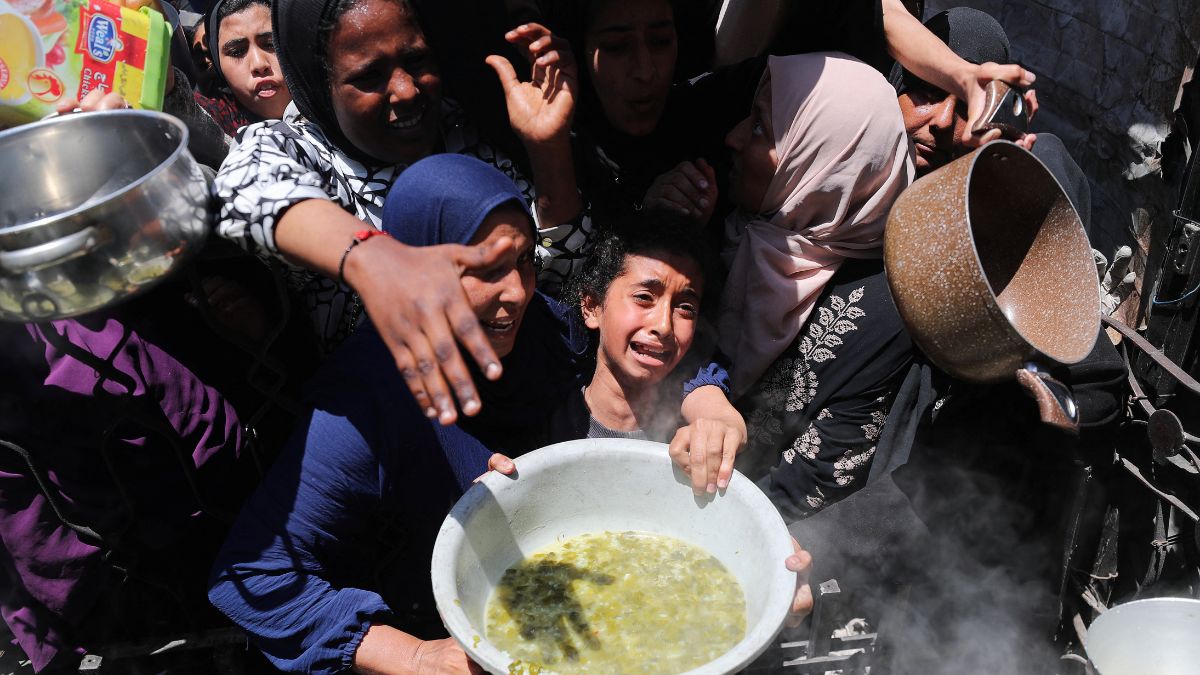US announces controversial private food aid plan for Gaza; UN keeps away
 A Palestinian receives food cooked by a charity kitchen, in Beit Lahia, northern Gaza Strip, May 8, 2025
A Palestinian receives food cooked by a charity kitchen, in Beit Lahia, northern Gaza Strip, May 8, 2025
The United States has announced a new humanitarian aid system for Gaza, bypassing the United Nations and traditional relief agencies, as Israel’s total blockade of the territory enters its third month. The initiative, coordinated through private companies and security contractors, has sparked alarm among aid groups and the UN, which have warned that it could weaponise humanitarian assistance and exacerbate the crisis for Gaza’s 2.3 million residents.
US Ambassador to Israel Mike Huckabee confirmed that the scheme involves the creation of "distribution centres" secured by private security firms, which will initially serve over a million Palestinians. These centres would supply pre-packaged rations, hygiene kits, potable water, medical supplies and blankets. The Gaza Humanitarian Foundation (GHF), a Geneva-registered NGO, will oversee the operation.
Though Israel will not be directly involved in the delivery or distribution of aid, it will provide perimeter security around the centres. Huckabee insisted that the move is necessary to prevent Hamas from diverting aid – a claim repeatedly disputed by the UN and international aid groups, which state their distribution systems are already tightly monitored.
The UN has categorically refused to participate in the GHF-led effort, citing concerns that the model militarises aid and undermines humanitarian principles. The GHF plan proposes setting up just four centralised aid hubs, each serving around three lakh people. Aid workers argue this falls far short of the infrastructure required to meet the urgent needs of Gaza’s population and would force civilians to relocate en masse to receive basic supplies – a move that could contribute to their displacement.
Despite the fanfare surrounding the plan, questions remain over its feasibility and neutrality. The 14-page GHF proposal, circulated among aid agencies and UN officials recently, details plans similar to those privately discussed by Israel for weeks. The document identifies a ten-member leadership team that includes former US military officers, private security affiliates and humanitarian professionals. David Beasley, the former head of the UN World Food Programme and former governor of South Carolina, is expected to lead GHF, though final decision has not been taken.
A US official, speaking anonymously, confirmed the document's authenticity but admitted substantial planning and resourcing are still required. The Trump administration appears eager to push the plan forward in time for the president’s upcoming visit to Gulf nations, where the US hopes to secure financial support for the initiative. The administration argues that the urgency of Gaza’s humanitarian catastrophe justifies an alternative mechanism.
However, the UN and other humanitarian bodies remain firmly opposed. Jens Laerke, spokesperson for the UN Office for the Coordination of Humanitarian Affairs (OCHA), said they would only participate in aid operations that align with humanitarian principles. OCHA has raised concerns about the extremely limited number of distribution sites, compared with the 400 operated before the blockade, and the heavy reliance on private contractors. The use of armoured vehicles and subcontractors from companies previously active in Israeli-controlled zones like the Netzarim Corridor has added to concerns that aid may be used for political and military ends.
The UN and NGOs say that Israel’s siege – not Hamas – is the main reason for Gaza’s spiralling hunger crisis. Community kitchens and international field kitchens have shut down due to shortages, and food prices have skyrocketed. A 25kg bag of flour now costs $415 in Gaza City – 30 times more than it did in February.
Hamas, for its part, condemned the new plan, calling it a tool for displacement and "a blatant violation of humanitarian standards". Aid groups have echoed this view, warning that the system risks turning hunger into a form of population control. By centralising distribution and requiring families to travel long distances, the plan may depopulate entire areas of Gaza.
The GHF proposal states that assistance will be given based on need without vetting or eligibility requirements, a point that distinguishes it from Israeli-backed ideas, which reportedly involve facial recognition technology and screening of recipients. However, aid organisations doubt the proposed mechanism’s ability to meet core humanitarian principles such as neutrality, independence and impartiality.
Jamie Williamson of the International Code of Conduct Association, which monitors the ethical conduct of private security firms in conflict zones, warned that these companies must be fully vetted and adhere to international humanitarian law. Without rigorous oversight, the involvement of such contractors could escalate tensions and undermine the credibility of relief efforts.
Tamara Alrifai, spokesperson for the UN agency for Palestinian refugees (UNRWA), described the new system as logistically unworkable and a dangerous precedent. She warned that countries should not use siege as a tactic of war to dismantle long-established and effective humanitarian systems in favour of politically driven alternatives.
Aid workers further stress that existing humanitarian operations have been constrained less by diversion or inefficiency than by the Israeli military’s restrictions on movement and the limited volume of aid permitted into Gaza. Convoys have been targeted by criminal gangs or overwhelmed by desperate civilians, but agencies say these are consequences of the blockade rather than evidence of systematic looting.
As food supplies dwindle and infrastructure collapses, the UN remains adamant in its refusal to support the GHF-led plan. “This mechanism appears practically unfeasible, incompatible with humanitarian principles, and will create serious insecurity risks – all while failing to meet Israel’s obligations under international law,” says OCHA. “It is a dangerous precedent to dismantle existing aid structures in order to enforce a siege. We will not participate. This is not humanitarianism – it is control disguised as compassion.”
Middle East